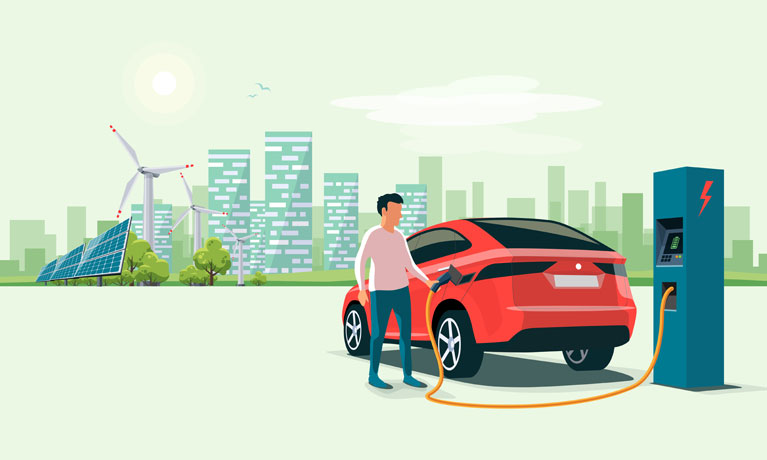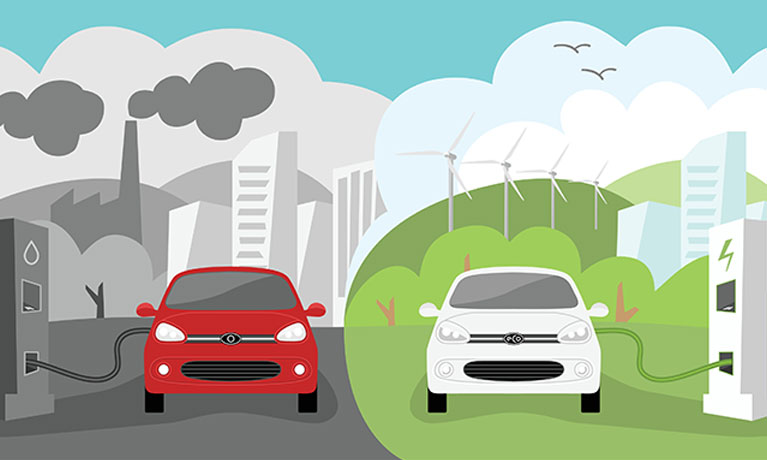The COVID-19 pandemic has caused an unprecedented economic shock with the International Monetary Fund forecasting a 4.9% decline in global GDP during 2020. The recovery from this crisis is highly uncertain with many businesses, particularly those in the service sector, unable to operate at full capacity. However, the pandemic also offers an opportunity to reshape the economy through a ‘green recovery’, with the UK Government committed to building back greener and using this investment as a means of addressing underlying economic imbalances.
The notion of a green recovery has gained traction due to the temporary improvement in air quality achieved during the period of lockdown. However, as the International Energy Agency point out, this is no cause for celebration. Instead, there needs to be the development of a set of policies that ensure environmental gains are secured through sustainable means. Critically, there needs to be a focus, from policymakers, on aspects such as mobility and using investment in electric vehicles, for example, as a means of capturing both economic and environmental benefits.
Potentially, investment in green technologies represents an opportunity to generate prosperity and reduce some of ‘scarring’ wrought by the pandemic. For example, supporting the development of electric vehicle charging infrastructure may provide opportunities for new businesses to emerge.

However, the benefits accruing from a green recovery are not just for the longer-term. Research from Hepburn et al (2020) found that implementing policies designed to secure a green recovery would have more immediate benefits than those generated by traditional measures. For instance, the installation of new electric vehicle charging infrastructure can be done quickly, and will not be impacted by the need for social distancing. Critically, investments such as this can enable a quick return to the labour market for those seeking work.
Although the current government has made the commitment to build back greener, the UK is currently lagging behind other nations in formulating investment plans in this space. For example, in Germany, the government COVID-19 recovery programme is to allocate around £46bn to investments in clean technologies such as electric vehicles. In contrast, the UK proposals announced so far allocate around £3bn worth of investment in comparable areas. To secure ‘market leadership’ the UK will need to expand this investment, but will also need to consider more holistic solutions addressing some of the key challenges of the pandemic.
Whilst the Confederation of British Industry has identified technologies such as carbon capture, hydrogen and electric vehicles as key areas for investment, these proposals need to go further than simply prescribing areas for spending. For example, investment in these technologies must be supported by an extensive retraining programme in order to ensure that employment opportunities are available for those who have lost their jobs during the pandemic. Moreover, the green recovery also has a potentially significant role to play in ensuring the future vibrancy of urban areas that are currently struggling due to the absence of office workers and shoppers.
Ensuring the future vibrancy of city locations is imperative for policymakers. A green recovery can help to modernise the transport offer in these areas, bringing new technologies into the mobility mix. In addition, encouraging the usage of electric vehicles in these locations will have further benefits in terms of improving the environment and potentially making these areas more attractive to visitors. However, these proposals must be inclusive as there is a danger that some groups could be left behind or unfairly penalised due to the level of technological change associated with a shift to a greener economy. For example, if financial penalties are levied on ‘conventional’ vehicles due to their greater level of emissions, this is likely to be highly regressive and impact those on low incomes hardest. In addition, if cashless and touchless systems form part of the public transport offer, there needs to be consideration given to how those without access to the internet or bank accounts will be impacted.
Finally, there also needs to be continued investment in incentives in order to encourage behavioural change from consumers. New technologies also provide the basis for exploring alternative multi-modal platforms, such as connecting e-scooters with rail, in order to provide these passengers with a viable last mile alternative to using bus services. Potentially, a green recovery could provide the basis for a long-term economic transformation leading to the development of new industries and a greater resilience. However, if consumers, for example, cannot be convinced about the merits of this approach then it is likely to fail. Therefore, in order to secure a successful green recovery there needs to be ‘buy in’ from all stakeholders otherwise the opportunities that are afforded by this agenda may not be taken.
Reference
Hepburn, C., O’Callaghan, B., Stern, N., Sitglitz, J., and Zenghelis, D. (2020) Will COVID-19 fiscal recovery packages accelerate or retard progress on climate change? Available at: https://www.smithschool.ox.ac.uk/publications/wpapers/workingpaper20-02.pdf




Comments are disabled